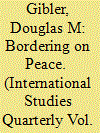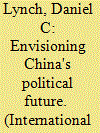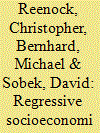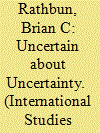|
|
|
Sort Order |
|
|
|
Items / Page
|
|
|
|
|
|
|
| Srl | Item |
| 1 |
ID:
078838


|
|
|
|
|
| Publication |
2007.
|
| Summary/Abstract |
This paper addresses a puzzle of how conflicts characterized by significant power asymmetries often play out much differently than dominant powers expect. We adapt the notions of institutionalized peace and riot systems from the literature on ethnic violence to identify ways in which social institutions attenuate collective action dilemmas, thereby increasing capability for a less-powerful group. Dominant groups often miscalculate the true nature of capability relationships by failing to account for these group-specific institutions that operate in the face of exogenous threats. We illustrate our model with two episodes of Chechen mobilization in the 1990s
|
|
|
|
|
|
|
|
|
|
|
|
|
|
|
|
| 2 |
ID:
078839


|
|
|
|
|
| Publication |
2007.
|
| Summary/Abstract |
Bargaining at various levels has taken on a greater role in our understanding of international relations. work presented a model in which bargaining at the international level would result in the status quo advantaged actor getting his ideal agreement. We conducted a face-to-face experiment between sixty-eight pairings of men to test this prediction in a controlled setting. All of the participants were presented with the same bargaining problem in different contexts. For each pairing, we collected data on a trial bargaining period under a "classic" Nash bargaining problem (under private information, but without monetary incentive) and two bargaining periods with an underlying unidimensional issue space (i.e., Milner's model, once under private information, the other under full information, each with monetary incentive). While the Nash bargaining solution was consistently chosen under the "classic" Nash bargaining problem, it was rarely chosen when the bargaining problem represented an underlying unidimensional issue space. For the unidimensional bargaining problem, private information did not facilitate producing any consistent outcome; under full information, the "equity point"-in which each participant earned the same dollar amount-was chosen significantly more often than any other outcome, even under a context in which the equity point was incentive incompatible for one actor to agree to that agreement. The overall results suggest that the Nash bargaining solution is predictive when it is also a focal point in the bargaining space, but is only prescriptive in a bargaining space with many mutually improving points. Finally, private information allowed the status quo advantaged actor to get a better deal compared to the full-information condition.
|
|
|
|
|
|
|
|
|
|
|
|
|
|
|
|
| 3 |
ID:
078835


|
|
|
|
|
| Publication |
2007.
|
| Summary/Abstract |
I argue that democracy and peace are both symptoms-not causes-of the removal of territorial issues between neighbors, and in this sense the "empirical law" of democratic peace may in fact be spurious. As democracies tend to stabilize their border relations prior to becoming democratic, democracy as an independent variable in conflict studies captures the effects of an absence of territorial issues. States without these issues are less prone to disputes prior to regime type, and I show that, after controlling for the presence of stable borders, joint democracy exercises no pacifying effect on conflict behavior from 1946 to 1999.
|
|
|
|
|
|
|
|
|
|
|
|
|
|
|
|
| 4 |
ID:
078843


|
|
|
|
|
| Publication |
2007.
|
| Summary/Abstract |
Democratic domestic governance has become a global constitutive norm. The fully socialized, "normal" state in international society is now expected either already to be democratic or embarked upon a democratization trajectory. But in China, the ruling Communist Party (CCP) rejects this norm and vows to construct an authoritarian new "political civilization" superior to democracy. Supportive Party intellectuals contend that most of the constitutive norms asserted to be global are actually manifestations of Western ideational power. CCP elites argue the impossibility of a global culture beyond the agency of states, which they regard as the ontologically primary actors in world politics. China's rise-its rapid increase in comprehensive national power-affords these elites the material and ideational resources they need to resist reconstitution by global democratic norms. Their efforts will probably keep the international society of states significantly pluralist (in the English School sense) well into the future
|
|
|
|
|
|
|
|
|
|
|
|
|
|
|
|
| 5 |
ID:
078841


|
|
|
|
|
| Publication |
2007.
|
| Summary/Abstract |
What explains the abolition of extraterritoriality in world politics? Which factors account for the variation in the timing of the abolition process? I develop a state-building explanation for the abolition of extraterritoriality. I find that traditional explanations of the abolition of extraterritoriality that rely on power and culture do not account for Western states' decisions to keep or abolish extraterritoriality. I suggest that the state-building practices of non-Western countries, specifically the institutionalization of a state-based legal system, are key to explaining why Western states decided to keep or abolish extraterritoriality. I test my argument against alternative explanations using a comparative case study of the abolition process in Japan and China
|
|
|
|
|
|
|
|
|
|
|
|
|
|
|
|
| 6 |
ID:
078844


|
|
|
|
|
| Publication |
2007.
|
| Summary/Abstract |
Competition to attract foreign direct investment (FDI) creates opportunities for multinational enterprises (MNEs) to diffuse corporate management practices from their countries-of-origin (home countries) to countries hosting their foreign operations. We examine conditions under which MNEs transfer corporate environmental practices from home countries to host countries. Our focus is on ISO 14001, the most widely adopted voluntary environmental program in the world. We examine inward FDI stocks and ISO 14001 adoption levels for a panel of 98 countries, and a subset of 74 developing countries, for the period 1996-2002. We find support for the country-of-origin argument in that inward FDI stocks are associated with higher levels of ISO 14001 adoption in host countries only when FDI originates from home countries that themselves have high levels of ISO 14001 adoption. Countries' ISO adoption levels are associated not with how much FDI host countries receive overall but from whom they receive it. Three implications emerge from this study: (1) FDI can become an instrument to perpetuate divergence in corporate practices across the world; (2) economic integration via FDI can create incentives for firms to ratchet up their environmental practices beyond the legal requirements of their host countries; (3) instead of racing down to match the less stringent corporate practices prevalent in developing countries, developed countries can employ FDI outflows to ratchet up corporate practices abroad given that developing countries are net recipients of developed countries' FDI outflows.
|
|
|
|
|
|
|
|
|
|
|
|
|
|
|
|
| 7 |
ID:
078837


|
|
|
|
|
| Publication |
2007.
|
| Summary/Abstract |
This article examines the relationship between intellectual property (IP) and public health, with a focus on the extension of AIDS treatment in the developing world. While most of the literature on IP and health examines the conditions affecting poor countries' capacities to acquire essential medicines, I show the distinct-and more complicated-political economy of production and supply. IP regulations alter the structure of generic pharmaceutical sectors in the countries capable of supplying essential medicines, and changes in market structure affect actors' economic and political interests and capacities. These new constellations of interests and capacities have profound implications for the creation and maintenance of political coalitions in support of on-going drug supply. The result is that the global AIDS treatment campaign becomes marked by mismatches of interests and capacities: those actors capable of taking the economic, legal, and political steps necessary to increase the supply and availability of essential drugs have diminished interest in doing so, and those actors with an interest in expanding treatment may lack the capacities to address the problem of undersupply. By focusing centrally on actors' interests in and capacities for economic and political action, the article restores political economy to analysis of an issue-area that has been dominated by attention to international law. And by examining the fragility of the coalitions supporting the production and supply of generic drugs, the article points to the limits of transnational activist networks as enduring agents of change.
|
|
|
|
|
|
|
|
|
|
|
|
|
|
|
|
| 8 |
ID:
078842


|
|
|
|
|
| Publication |
2007.
|
| Summary/Abstract |
Many scholars have argued that unequal socioeconomic distribution constitutes a threat to democratic survival. However, the evidence in support of this claim has been contradictory. We argue that this inconsistency derives from the literature's assumption that income inequality will adequately reflect the conditions under which demands for radical redistribution will emerge and trigger antidemocratic elite reactions. We argue instead that when developmental context is taken into consideration, absolute forms of distribution, like basic needs deprivation, are better indicators of these conditions. When needs deprivation exists in the face of enhanced economic development, citizens will not only notice deprivation more readily, but also, given the greater social surplus, deem it more unacceptable, provoking radical demands for redistributive justice. This combination of development and continuing basic needs shortfalls, a condition that we refer to as regressive socioeconomic distribution, will threaten democratic survival. Using event history analysis on a sample composed of all democracies from 1961 to 1995, we confirm that regressive socioeconomic distribution increases the risk of breakdown.
|
|
|
|
|
|
|
|
|
|
|
|
|
|
|
|
| 9 |
ID:
078840


|
|
|
|
|
| Publication |
2007.
|
| Summary/Abstract |
As intergovernmental organizations (IOs) have grown in number and influence, there has been an increase in calls for their accountability, not just to governments but also toward the general public. One of the principal ways they can improve their accountability is by becoming more transparent, that is, offering more information to the public. Over the past decade, some IOs have adopted official policies and changed their practices concerning public access to information, while others have not. This study asks which IOs are likely to be transparent. To answer this question, it derives several hypotheses based on the existing international relations literature as well as the literature explaining government transparency in the domestic realm. The hypotheses focus on the roles of the principal actors affecting access-to-information from IOs: member states, IO bureaucracies and international nongovernmental organizations. This study tests these hypotheses across 72 IOs by using three newly developed measures of transparency. It finds that some of the main factors that explain IO transparency are analogous to those that have affected government transparency at the domestic level.
|
|
|
|
|
|
|
|
|
|
|
|
|
|
|
|
| 10 |
ID:
078836


|
|
|
|
|
| Publication |
2007.
|
| Summary/Abstract |
The force of uncertainty is central to every major research tradition in the study of international relations. Yet uncertainty has multiple meanings, and each paradigm has a somewhat unique understanding of it. More often than not, these meanings are implicit. I argue that realists define uncertainty as fear induced by anarchy and the possibility of predation; rationalists as ignorance (in a nonpejorative sense) endemic to bargaining games of incomplete information and enforcement; cognitivists as the confusion (again nonpejoratively) of decision making in a complex international environment; and constructivists as the indeterminacy of a largely socially constructed world that lacks meaning without norms and identities. I demonstrate how these different understandings are what provide the necessary microfoundations for the paradigms' definitions of learning, their contrasting expectations about signaling, and the functions provided by international organizations. This has conceptual, methodological, and theoretical payoffs. Understanding uncertainty is necessary for grasping the logic of each paradigm, for distinguishing them from each other, and promoting interparadigmatic communication
|
|
|
|
|
|
|
|
|
|
|
|
|
|
|
|
|
|
|
|
|